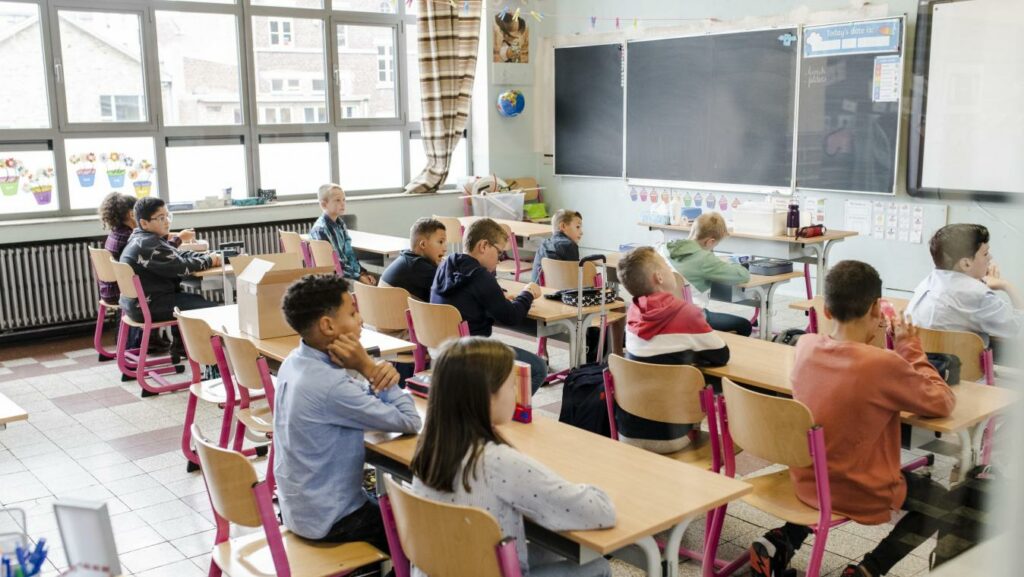Teachers in Belgium are quitting en masse, both in primary and secondary education, leaving students falling behind in classes where in many cases shortages are resulting in the cancellation of classes.
Certain subjects have not been taught for months, according to De Morgen. And that inevitably impacts the quality of education.
“For months, my 16-year-old daughter and 12-year-old stepdaughter have not been taught in various subjects,” said sociologist and parent Dirk Jacobs on Twitter. “I hear similar echoes from other schools.”
Fellow parents flock to comment on the tweet, detailing how a French teacher has not been replaced for a whole semester, while the cultural sciences class has only been taught sporadically after a teacher dropped out due to burnout.
Frustratietweet. Al maandenlang krijgen mijn 16-jarige dochter en 12-jarige plusdochter voor verschillende vakken geen les. Ik hoor gelijkaardige echo's van andere scholen. Ik hou echt mijn hart vast over het lerarentekort en de te verwachten impact op kwaliteit van het onderwijs
— Dirk Jacobs (@DirkJacobs71) May 19, 2022
Translation: Frustration tweet. For months, my 16-year-old daughter and 12-year-old plus daughter have not been taught in various subjects. I hear similar echoes from other schools. I really hold my breath about the teacher shortage and the expected impact on the quality of education.
Education for newcomers who speak a different language, such as Ukrainian students, are often sent home several hours before the official end of the day to the teacher shortage.
As the problem seems to be getting worse by the week, parents are turning desperate.
Education specialist Pedro De Bruyckere acknowledges the issue, as the Artevelde college has been surveying the teacher shortage at schools over the past year and a half. “In the last survey from two weeks ago, 43% indicated that there are classes that are not taught for several hours a day. In November 2020, that was only 20%.”
Mainly foreign languages
The issue seems to be the most severe among language subjects, as 21% of the cancelled classes were in foreign languages and 7% in Dutch.
Kristof De Witte, an education economist at KU Leuven, explains that in-person teaching is the most important in these subjects: “Language requires interaction: you often have to repeat and apply vocabulary and grammar, so that you offer many speaking opportunities.”
Meanwhile, exact sciences require less interaction, and it is easier to offer study materials digitally.
Online education
Online education is the short-term solution to tackle this problem, De Witte says. “You have to use the teachers who do exist more efficiently. This can be done by opting for blended learning, where you record a number of theoretical lessons on video and where the students can learn this theoretical knowledge.”
“In addition, it is important to create central learning material, which remains a challenge in Belgium. During the moments in class, the students’ questions can then be dealt with in a very concrete way and practice can take place.”
Related News
- 4,700 Ukrainian children enrolled in Dutch-speaking schools
- European Commission highlights inequality in Belgian schools
- Cries for help from education sector grow as financial resources drain
However, De Bruyckere sees certain obstacles. “That would be good if there were fewer teachers, but in this case, there are often none at all for certain subjects. Then this is not a solution.”
He views the future very bleakly. “Look at a city like Amsterdam, for example, where they have now decided to only teach four days instead of five because there are not enough teachers. Usually, they are three years ahead of our misery. I don’t know of any magic formula that could simply solve this.”
A downward spiral
But there are minimum standards that can still be met, says De Bruyckere, who mainly fears a growing gap between secondary and higher education which will become increasingly difficult.
“As students receive fewer lessons in certain subjects, these will also be less popular to study at university. After all, it is often the teachers who make their students enthusiastic about the subject matter.”
That results in a downward spiral which will continue for years to come, he explains: “We will have even fewer teachers available for those subjects in the future.”
De Bruyckere points out that the situation is even direr in vocational education, but because the numbers are smaller, the issue is 'swept under the rug', he says.
“In person-teaching is even more important there. This also concerns shortage professions, such as masons or electricians. This also has direct consequences for our economy.”
The issue of private lessons
Parents seek private lessons as a solution, especially if they do not have the time or means to sit down with their children to study the subject matter.
While De Bruyckere agrees that this is understandable, it makes the problem even worse, as it removes more potential teachers from the system.
“I don’t think these private tutors do it for the money, but simply because it’s more fun to work with smaller groups of motivated students. The socio-economic differences are thus deepened even more between the parents who can afford it and the parents for whom such a thing is unaffordable.”

